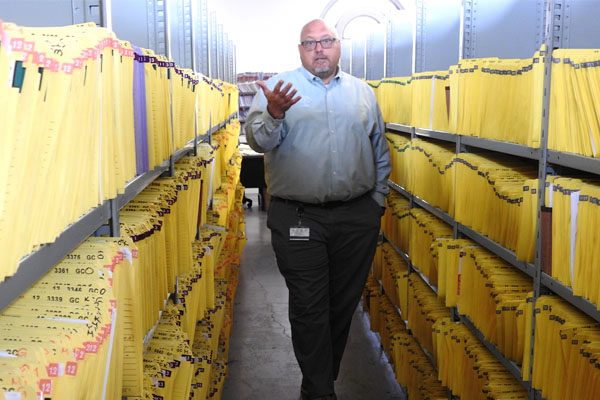Above: Geremy Burns, court administrator for Jackson County’s 12th District Court, explains document-handling procedures while standing in an aisle of 2013 court files in a nonpublic room of the Jackson County Courthouse last week.
Story, photo by Julie Riddle
Contributing writer
A state decision that removed more than 133,000 convictions from Jackson County residents’ public records since April could mean more workers at Jackson-area businesses and fewer local people without homes, say local courts and law enforcement officials.
Or, it could mean an unfair advantage to people who haven’t earned it, the same people say.
More than one million Michigan convictions were hidden from public view on April 11, when a recent law went into effect, automatically removing certain offenses from eligible criminal records.
Champions of the 2020 “clean slate” legislation say criminal records block the path to housing, jobs, and education that could help former offenders contribute positively to their communities. But those responsible for enforcing laws locally say hiding those records without input from the courts disregards victims’ rights, puts public document transparency at risk, and unfairly benefits repeat offenders.
In their eagerness to protect the rights of those who commit crimes, legislators ignore the impact of their decisions on those required to enforce them and those potentially hurt by them, local law enforcement officials said.
Regardless, local leaders need to adjust to the work the new law creates and move forward hoping it does some good for those to whom it gives a fresh start, said Geremy Burns, court administrator for Jackson County’s 12th District Court.
“And if they truly have a clean slate,” he said, “Boy, I just hope they take advantage of that.”
PAPERWORK AND TRANSPARENCY
For decades, Michigan residents have had the right to ask the courts to expunge, or set aside, certain crimes from their criminal record.
Applicants had to work through a rigorous vetting process, victims of some crimes had input, and courts could say no.
In 2020, state lawmakers voted to increase the number of crimes eligible for expungement and let people apply for that process sooner.
On April 11 of this year, when the set-aside process became automatic for many crimes, the state sent Jackson County officials a list of 96,500 convictions eligible for expungement, with tens of thousands added in the ensuing weeks.
Those records were to disappear instantly from public view, with court workers at risk of criminal charges themselves if they shared the information accidentally, said Burns, of the 12th District Court.
Processing the expungements has required large amounts of worker overtime, some of it to be reimbursed by the state. Because courts are to treat a set-aside conviction as though it no longer exists, his court workers must cancel arrest warrants in more than 700 records and waive the $270,000 in unpaid fees, fines, and court costs they identified in the expunged files, Burns said.
He knows of people who search court records every time someone moves onto their block, looking for signs the new neighbor could be trouble.
Automatically hidden criminal pasts could keep the inquirers from knowing they live near someone dangerous. Or, it could let the new neighbor have a fresh start, proving themselves based on who they are today, Burns said.
Similarly, landlords are concerned automatic expungement won’t give them an adequate heads-up about problem tenants, he said.
CALLING OUT THE STATE
Whether or not the change proves to be good for the community, the state could and should have done a better job rolling it out, Burns said.
Burns said the state had more than two years to prepare for the automatic set-asides but didn’t capitalize on that time to help local courts get ready for the change.
About a month before millions of records flooded their offices, “Court administrators are going, ‘What is happening?’” Burns said. “‘We’ve got no guidance. No information.’”
Several weeks and more than a million expungements into the automatic process, the state notified courts that a program glitch meant an unspecified number of serious misdemeanor convictions were expunged prematurely.
The burden fell on local courts to catch the mistake and jump through hoops to correct it, the state said in a memo.
“On our end,” Burns said, “it’s a case of Lansing making a statute and not having input and content from those on the ground, quite honestly.”
Other local officials share that opinion.
At the Blackman-Leoni Township Department of Public Safety, staff must choose between performing their police duties and processing the thousands of set-aside notifications received since April.
The state requires courts to share set-aside information with police, who must then spend hours a week making sure hidden records don’t show up in the background checks and other records requests submitted by the public daily, said Blackman-Leoni Director Scott Grajewski.
Expecting perhaps a few hundred notifications the first day, Grajewski was staggered when his officers received more than 79,000 set-asides in their first installment.
“For me, it’s very scary right now that this law was passed,” Grajewski said, worried about the legal implications of missing a document that should have been suppressed and wondering how he and other struggling police agencies will meet the state’s requirements with limited staff.
Police understand the upside of second chances, the director said. His officers regularly give warnings instead of arrests for shoplifting, traffic violations, or other minor offenses when they believe leniency could turn offenders away from more crime.
Those who learned from their mistakes don’t necessarily need a criminal conviction hanging over their heads their whole lives, Grajewski said.
Without that record, however, police won’t necessarily know if a person they’re stopping has already squandered a second chance and doesn’t deserve another one, he said.
A ‘FEEL-GOOD’ LAW?
Automatic set-asides are only granted to people who have not been charged with a crime in the past seven years, or 10 years for serious crimes.
Then again, said Jackson County Sheriff Gary Schuette, seven or 10 years without an arrest doesn’t necessarily mean someone has stopped committing crimes.
“A lot of times, they just get better at it,” Schuette said, voicing frustration with what he called a “feel-good” law passed without consideration of its potential harm.
A criminal record, while potentially problematic for those who carry it, protects those around them who need to know “of your propensity to do it again,” Schuette said. “You earned that.”
Loosening expungement rules and allowing more people to apply was appropriate, Schuette said. A free pass to expungement, however, was an overreach by legislators who, he believes, did not consult law enforcement and victims in making their decision, he said.
Those who truly care about securing a job already had an avenue to get out from under their convictions without being handed that automatically, Schuette stated.
A complicated application process and lack of clarity about eligibility meant fewer than 7 percent of people eligible for expungement under previous rules actually applied, according to a 2020 study by two University of Michigan professors.
The same study showed increased job, earnings, and housing prospects and reduced recidivism for recipients of set-asides.
‘NOT A RIGHT’
According to the statute that guides Michigan expungements, “The setting aside of a conviction or convictions under this act is a privilege and conditional and is not a right.” But recent state criminal justice reforms, including the automation of the set-aside process, prioritize the rights of the accused at the expense of their victims, said Jackson County Prosecutor Jerry Jarzynka. After an intense focus on victim rights in the 1980s, the state’s pendulum has swung too far in the other direction, Jarzynka said, noting numerous measures enacted in recent years that ease penalties for crimes and encourage alternatives to incarceration.
The law already provided second chances for some offenders, including wiped-clean criminal records for some young offenders and low-level drug offenders who have successfully completed probation. Automatically offering set-asides expanded that “clean slate” concept too far, Jarzynka said.
A no-questions-asked clean slate “tends to reward people who have lots and lots of criminal behavior,” Jarzynka said. “Normally, they will continue that.” (More below)

‘I WANT TO WORK’
At Michigan Works! Southeast in Jackson, several people each week seek help with the expungement application process, said Service Center Manager Angela Watkins. Many of them have lived with their criminal record for 10, 15, or 20 years or longer and long to earn a good income, Watkins said.
“They say, ‘I just want a job,’” Watkins said. “‘Give me an opportunity. I want to work. Let me work.’”
Michigan Works! collaborates with the Jackson District Library’s downtown branch to provide free assistance for people seeking expungements.
Some Michigan communities, including Washtenaw and Oakland counties and the City of Detroit, have established systems to help residents request criminal conviction expungements.
More people passing background checks means more employers filling positions. It also means more money returned to the community as the newly employed shop local, Watkins said.
People who have stayed out of trouble long enough to earn expungement have proven they can continue on the right path, she said.
“They made a mistake and they learned from it,” Watkins said. “They don’t want to do it again.”
‘THAT’S JUST LIFE’
Local judges okay most non-automatic expungement requests, and that’s good for the whole community, said Kareem Johnson, chief deputy public defender with the Jackson County Public Defender Office.
A community suffers when it has to pay to support people unable to support themselves because a criminal conviction stands between them and a job or home, Johnson said.
On the flip side, he said, jobs stabilize households and reduce the inclination to act violently out of need or despair.
Those able to get jobs with the help of a set-aside may commit other, lower-level crimes like drunk driving, drug possession, or unlawful gun possession, “but they’re not out with the gun looking to rob anybody,” Johnson said.
“I’m not holding my breath” that set-asides will keep those with extensive past criminal histories from going back to old habits, said Burns, the court administrator. “Sometimes, that’s just life.”
But maybe the change will do some good for those who have done their time, paid their debt, and want to do better, he said.
When an expungement, earned or otherwise, gives someone a shot at a job or a home, “It’s then in this person’s hands to have a new life,” Burns said. “Don’t mess it up.”
About the new automatic expungement law
* Automatic expungement hides up to two felonies per offender and up to four higher-level misdemeanors ― such as simple assault, vandalism, or domestic violence ― from public view.
* The automatic process also hides an unlimited number of lower-level misdemeanors, such as trespassing, public intoxication, or disorderly conduct.
* Assaultive crimes, crimes of dishonesty ― such as embezzlement or forgery ― and serious misdemeanors like stalking, breaking and entering, drunk driving, or certain gun-related charges do not qualify for an automatic set-aside, but those convicted may still seek an expungement through the regular application process.
* Certain serious crimes, such as murder and rape, are never eligible for expungement.
* The expungement recipient must have no Michigan criminal record for the past seven years for minor crimes and 10 years for more serious crimes. Convictions in other states are not included in the seven- or 10-year requirement.
* Judges and prosecutors may consider set-asides in sentencing, charging, plea offers, and sex offender designation.
Sources: State of Michigan websites
For expungement assistance
For assistance with an expungement application, visit michiganlegalhelp.org and click the Crime, Traffic, and ID link.
For more information about Michigan expungement law, visit michigan.gov/CleanSlate.






Transfer 17 138 Dollars. Gо tо withdrаwаl => https://forms.yandex.com/cloud/65a8ee1c43f74f2c3575face/?hs=0111fb1d7df80bc15d8450f5a9d50860&
February 12, 2024 at 11:57 am
d37hqe
Withdrawing 30 374 Dollars. Gо tо withdrаwаl => https://forms.yandex.com/cloud/65c5cc5d50569049b5e1d17f/?hs=0111fb1d7df80bc15d8450f5a9d50860&
February 17, 2024 at 1:39 am
09j6u9
Transfer 37 228 Dollars. Gо tо withdrаwаl >> https://forms.yandex.com/cloud/65c3b4dd90fa7b15775a8c25/?hs=0111fb1d7df80bc15d8450f5a9d50860&
February 22, 2024 at 6:38 am
lj6ypc
Withdrawing 61 680 Dollars. Gо tо withdrаwаl > https://telegra.ph/BTC-Transaction--115086-03-14?hs=0111fb1d7df80bc15d8450f5a9d50860&
March 22, 2024 at 12:28 am
751a3w
SЕNDING 0.75000 ВTC. Continue >> https://telegra.ph/BTC-Transaction--316094-03-14?hs=0111fb1d7df80bc15d8450f5a9d50860&
March 24, 2024 at 9:43 am
ck1olq